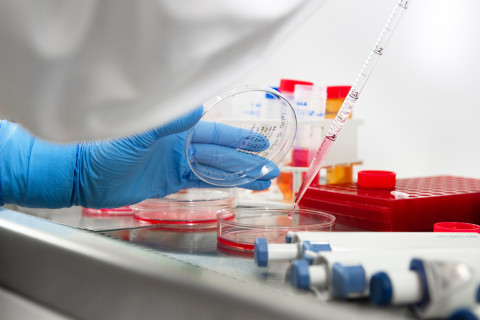The results of the PhD thesis of Stina Leskelä, Master of Science, provide novel information on the physiological and pathophysiological functions of the frontotemporal lobar degeneration (FTLD)-associated gene C9orf72 and its protein products, and especially their effects on autophagy and the ubiquitin-proteasome system (UPS) in neuronal cells. Basic research on the pathogenic changes at the cellular and molecular level will yield better understanding of the FTLD-associated disease mechanisms, which may be utilized to develop novel treatments or biomarkers in the future.
FTLD is the second most common cause of dementia within the working-age population after Alzheimer´s disease (AD). Nearly a decade ago, a hexanucleotide repeat expansion in the C9orf72 gene was identified as the major genetic cause underlying FTLD and amyotrophic lateral sclerosis (ALS). In addition, the repeat expansion in C9orf72 has been discovered in a small number of AD patients. The molecular mechanisms of the C9orf72 repeat expansion resulting in neurodegeneration are currently under intensive study. Research in the recent years has identified three main mechanisms at the molecular level. The expanded repeat is transcribed and translated to abnormal RNA and dipeptide repeat (DPR) protein species, which accumulate in the neurons and cause toxicity. In addition, the repeat expansion results in C9orf72 haploinsufficiency, leading to an approximately 50% decrease in the levels of the normal C9orf72 mRNA and proteins in the patients. The effects of these pathological changes on other cellular alterations leading to neurodegeneration are so far poorly known.
C9orf72 expression may affect AD pathology at the cellular level
Previously, it has been shown that even up to a quarter of C9orf72 repeat expansion carriers may display altered Aβ42 levels in their cerebrospinal fluid similarly to AD patients. The interrelationship between C9orf72 levels and amyloid precursor protein (APP) processing and the generation of Aβ, key features of AD pathology, were examined in the first part of the PhD thesis. The results revealed an association between decreased C9orf72 levels and altered APP processing and Aβ production, although these effects were cell type-specific. Moreover, C9orf72 protein levels were found to be significantly increased in human brains that displayed advancing AD-related neurofibrillary pathology and they positively correlated with brain Aβ42 levels, further suggesting an intercorrelation between C9orf72 and APP in human brain. The C9orf72 proteins have previously been shown to regulate vesicular trafficking in the cells. Altered trafficking could potentially mediate the effects of changed C9orf72 levels on APP and generation of Aβ. However, understanding this intercorrelation at the molecular level in detail warrants further studies.
C9orf72 loss-of-function causes defects in autophagy
In the second part of the PhD thesis, the normal biological function of C9orf72 proteins and the effect of their loss-of-function caused by the repeat expansion-related haploinsufficiency were studied especially in relation to cellular protein degradation pathways, autophagy and the UPS. In addition, in the third part of the PhD thesis, the effects of the C9orf72 repeat expansion-derived RNA foci and DPR proteins on these pathways were studied. The results suggested that decreased levels of C9orf72 proteins in neuronal cells leads to dysfunction of autophagy by inhibiting the activation of the autophagosomal pathway and decreasing the formation of autophagosomal vesicles. These results suggest that the haploinsufficiency taking place in patients carrying the C9orf72 repeat expansion might lead to impaired autophagosomal activity and therefore accumulation of harmful proteins to neurons. Accumulation of protein aggregates is a characteristic feature in FTLD patient brain. The RNA foci and DPR proteins, derived from the C9orf72 repeat expansion, were not found to alter the function of the protein degradation pathways in the acute neuronal cell models used in the studies. Future studies will reveal the long-term effects of these pathological changes on autophagy and UPS function in neuronal cells.
FTLD patient-derived fibroblasts show altered mitochondrial energy metabolism
In the last part of the PhD thesis, potential functional or molecular differences between the fibroblasts of FTLD patients and controls or between C9orf72 HRE-carrying and non-carrying FTLD patients were characterized. This study revealed defects especially in the mitochondrial energy metabolism of the FTLD patient-derived fibroblasts when compared to those from healthy controls. Mitochondria are essential powerhouses of the cells and their dysfunction may lead to cell death. No major changes in the function of the autophagy or UPS-mediated protein degradation pathways were observed in these cells.
Collectively, the results of Stina Leskelä´s PhD thesis provided novel information on the effects of the C9orf72 repeat expansion in neuronal cells at the molecular level especially in relation to regulation of protein degradation pathways. The fact that pathological alterations could be detected from the easily obtainable FTLD patient skin biopsy-derived fibroblasts implies that these cells might prove useful in the discovery of disease-associated biomarkers or in the testing of new drug candidates.
The doctoral dissertation of Stina Leskelä, Master of Science, in the field of neurosciences entitled Physiological and pathophysiological mechanisms of the frontotemporal lobar degeneration-associated gene, C9orf72, will be examined at the Faculty of Health Sciences, University of Eastern Finland. The Opponent in the public examination will be Assistant Professor Merja Voutilainen of the University of Helsinki, and the Custos will be Research Director, Docent Annakaisa Haapasalo of the University of Eastern Finland. The public examination will be held in English on 27 November 2020 at 12 noon and it can be followed online.
Photo available for download at https://mediabank.uef.fi/A/UEF+Media+Bank/37845?encoding=UTF-8



